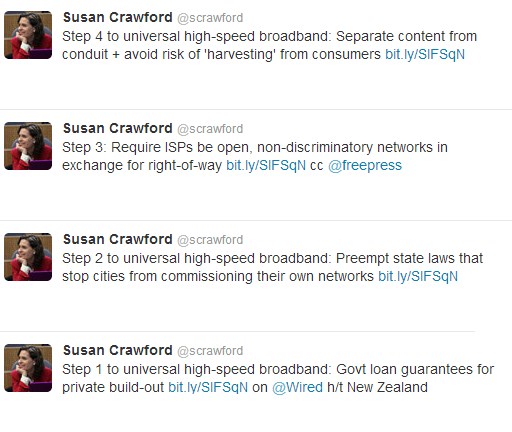 Efforts to develop new unlicensed uses for the public airwaves that include high-powered public Wi-Fi may be shelved if AT&T and House Republicans succeed in their joint effort to force those frequencies to be sold in a spectrum auction.
Efforts to develop new unlicensed uses for the public airwaves that include high-powered public Wi-Fi may be shelved if AT&T and House Republicans succeed in their joint effort to force those frequencies to be sold in a spectrum auction.
Majority House Republicans on the House Communications & Technology Subcommittee on Wednesday lectured all five FCC commissioners, insisting they have no authority to set aside spectrum specifically for unlicensed use when those airwaves could be sold to private companies.
Sub-Committee chairman Greg Walden (R-Ore.) criticized FCC Chairman Julius Genachowski for his plans to “give away” scarce airwaves eventually open to the public’s use when they could fetch as much as $19 billion in auction proceeds from large telecommunications companies seeking to own and control those frequencies.
Walden, the House’s second largest recipient of campaign contributions from the same companies likely to bid on that spectrum, insisted federal law only allows the Commission to designate unlicensed uses for so-called “technically necessary guard bands,” which act as a buffer between neighboring frequency users to protect against interference. Walden also criticized the FCC for setting aside too much spectrum for that protection.
The Oregon congressman has collected more than $84,000 in campaign contributions from telephone companies so far this year. Only House Speaker John Boehner won larger contributions from companies like AT&T.
Other Republican members of the subcommittee agreed with Walden’s sentiment and also received generous contributions from AT&T this year.
Rep. Lee Terry (R-Neb.), wanted to be sure the FCC does not impose “value-sapping restrictions” on the use of privately-owned airwaves owned by large telecommunications companies. Terry is the third largest recipient of campaign contributions in the House from those telecom companies, adding $69,400 so far this year to his campaign coffers.
Rep. Joe Barton (R-Tex.) expressed concerns that spectrum auctions could displace low-power television stations to make way for mobile communications. But Barton did not oppose the auctions generally. His largest contributor: AT&T, which sent him checks for more than $21,000 in 2012.
Representative Robert E. Latta (R-Ohio) suggested auctioning off airwaves intended for public use to large mobile broadband companies would help America’s competitiveness, alluding to his belief unlicensed, free use of the airwaves for new wireless applications would not. Latta cashed $10,500 in AT&T checks so far this year — his fourth largest contributor. Latta added he wanted there to be transparency and openness in the entire spectrum process. He did not disclose his significant contributions from AT&T at the hearing, despite being a chief stakeholder in the debate.
Rep. Marsha Blackburn (R-Tenn.) agreed with large telecommunications companies that the maximum amount of available spectrum should be sold off to private companies to sell mobile broadband services to the public. Blackburn’s third largest campaign contributor this year is Verizon Communications, who sent her $15,400. AT&T, her ninth largest contributor, handed her $13,250, together adding up to $28,650.
The Democrats on the panel roundly criticized Republican plans to sell off spectrum intended for unlicensed, public use applications to large wireless companies, which already own and control frequencies they still have not put into service.
Rep. Henry Waxman (D-Calif.) called unlicensed spectrum an incredible economic success story.
“Innovative services like Wi-Fi and Bluetooth are now ubiquitous parts of our communications system,” he said in his opening remarks. “They came about because of the use of unlicensed spectrum.”
Waxman suggested eliminating or limiting unlicensed spectrum would destroy innovation and further concentrate wireless communications in the hands of a handful of companies. Waxman said Congress’ original intent in passing laws that permitted the FCC to move forward with spectrum auctions also authorize the agency to protect competition and prevent unnecessary concentration of spectrum ownership to the detriment of smaller providers.
“I am troubled by attempts by some to relitigate issues that were resolved earlier this year, when the bill passed Congress with widespread support,” Waxman added. “After-the-fact-spin that unfairly twists the language of the law deserves little weight by the Commission or the courts.”
Rep. Anna Eshoo (D-Calif.) noted the FCC by statute is prohibited from considering the amount of revenue possible from spectrum auctions when drafting auction rules. She found Republican efforts to recast those rules to raise as much money as possible by selling off as much spectrum as possible “interesting.”
Many Republicans also complained the FCC must not set rules that either limit the maximum amount of spectrum owned by one company or set aside certain frequencies exclusively for smaller competitors. The Republicans want auctions to maintain a more straightforward “highest bidder takes all” format. Critics say that gives the advantage to larger, deep-pocketed existing providers and dissuades the entry of new competitors.
Some Republicans were also upset with FCC meddling over when and how private companies begin providing service on the airwaves they won at auction. Current FCC rules prohibit warehousing unused spectrum. The rules were designed to ensure large companies don’t invest in airwaves just to keep them off the market and unavailable to competitors.


 Subscribe
Subscribe













